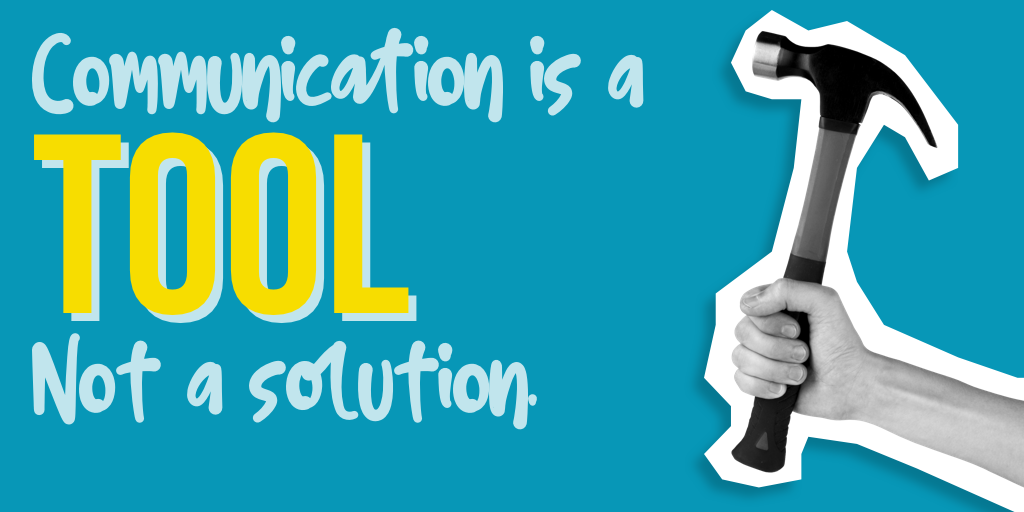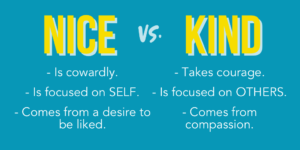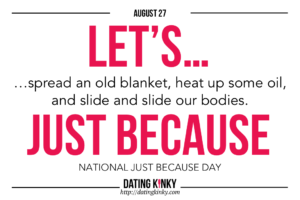It’s a common mistake. To treat communication as a solution, rather than a tool to reach a solution.
I’ve made that mistake quite a lot.
And I watch people make that mistake over and over in their own relationships and advice to others.
Communication does not fix things.
Let me explain.
Right now, in the local kinky discord I run for the RDU/Triangle area of NC for kinksters who want to MEET others (shoot me a note if you want details on how to join), as I writ this (about a week ago), we are having a conversation about the three classic solutions to any problem:
- More lube.
- Bigger hammer.
- More duct tape.
And I agreed and offered as kink corollaries:
- More lube (always).
- COMMUNICATE!
- More rope.
Which is a joke. And also how we often think of communication. As something that will FIX other things.
And just a bit earlier this morning (again, when I’m writing this a bit over a week ago), I said in the 🙋🏻🙋🏼🙋🏿-daily-q channel”
I think a lack of communication is almost always a contributing factor [in relationship endings], and much more rarely than people think the primary culprit.
Someone replied:
“I can say that not communicating our concerns and differences did not make the situation better. The concerns and differences were the problem, but not communicating killed any chances of the relationship surviving.”
Yes. Chances. That’s the key.
Consider this: What were the probabilities at that time, being the people you were and the problems you had?
And survival versus thrival is always a big thing in my mind.
Communication only works positively if people WANT to work together.
The problem is that whenever someone comes to a group with a problem with their partner, the answer is “COMMUNICATE!” as if that will solve things.
But it won’t, necessarily.
Because no matter how much you communicate, if you are missing a few key elements, you will still have the problem, or you may even create MORE problems.
- Priorities
- Openness
- Respect
- Compassion
- Autonomy
That’s not to say that communication in those cases will not get you something that looks like what you want, in the short term, anyway.
It’s simply saying that any of those things being missing when you communicate will not result in a positive result for your relationship survival, or (more importantly) thrival.
Because you are not compatible.
And I’ve talked about this before. In 2019, I wrote, “Communication Is NOT The Most Important Part Of A Relationship—Kinky Or Otherwise.”
And that was a sort of prelude to this writing. I said:
Because without that appreciation, you will run into communication killers—those things that will make your conversations into arguments and your collaborations into battles.
You’ll lose the benefit of the doubt to get you through stressful times, hurtful times.
You’ll try to make them over or run their lives or create rules like you might for a child, and well, that rarely goes over well.
So, today, I’m laying the groundwork. For a short series. On communication and why it is not a fix, anymore than a hammer is a fix. And how, just like a hammer, it can do good, and it can do harm.
And are you even communicating?
Or are you just saying words at someone?
Before I launch into the ways that communication, no matter how well-intentioned, can and will fail when those five things are missing in your relationship, let’s first talk about what communication is, and whether you are actually communicating.
Because I’m pretty sure we’ve all been talked at.
And I’m pretty sure we’ve all talked at others.
And in all of those cases, I’m gonna bet that the person doing the talking would have said they were communicating.
I say that communication needs two things to be communication:
- The message need to be received.
- The message needs to impart the intended information.
Let’s look at those two very simple (but easily missed) ideas:
1. The message need to be received.
Seems obvious, right?
In my communications class and book Understand Me Now—And That’s An Order! I use the example of my stamina in one room of my home with the door shut, talking to my partner who is in another room on the other side of the house with the door shut in a normal tone of voice.
Barring mobile phones, supernatural hearing, or ESP, my partner will not hear me, therefore I’ve not communicated.
Correct?
Yes, I know it is, and yes, I know you can probably think of ways that they can hear me that don’t include those three things, but that’s just quibbling and doesn’t help us move forward.
And there are other ways this applies. Like Covert contracts, which I’ve talked about quite a bit—unspoken expectations that you transmit through actions or behaviors to manipulate a situation to get what you want.
A clue to recognizing these is the thought:
I did [fill-in-the-blank], they should know it’s only fair that they [fill-in-the-blank]!
That’s not communication.
2. The message needs to impart the intended information.
And this is where most communication fails, and were it really becomes a skill needing lifelong practice.
Because it can fail in SO MANY WAYS. Let’s look at a few of those ways:
A. The communicator does not use the right words—and by this, I mean they may speak a different language, or they have not honed their vocabulary.
B. The communicator and the receiver do not share the same meanings and associations with the words being used.
C. The receiver is not open to the communicator’s words or intent, and is shut down.
D. The communicator is not sensitive to the receiver’s needs.
E. The communicator is not aware of receiver’s trauma.
F. The communicator is not speaking in good faith to share information, but to manipulate.
G. The communicator’s body language and words are at odds, so despite verbal or written clarity, the wrong information is transmitted.
I could probably come up with a few more, but I’d like to move on. And we’ll cover some more of these further on in the series.
smiles
Chances. That’s the key.
To go back to what I was saying before…even if your communication is spot on, if you do not have compatibility, openness, respect, compassion, and autonomy in your relationship, then what re the chances that your relationship will survive or thrive being the people you are and the problems you have?
And is that your only goal?
Because that’s not how communication works.
Because it’s not a solution.
In a relationship your priorities, openness, respect, compassion, and autonomy—which are all ultimately your compatibility—is the solution.
Just a few weeks ago, I wrote, “Guaranteed! Fix 70% of Your “Basic Bitch” Relationship Problems With This ONE Simple Trick!” and talked about how important partner selection is. How critical that you gauge your compatibility.
And it is.
And communication is HUGELY useful there. Critical. Maybe THE best (even only) tool for the job. And not used nearly often enough in the early stages to prevent so many future issues.
It’s still not a solution. The compatibility or lack thereof is the solution (whether for good or ill).
If you don’t have compatibility, communication and sheer stubbornness can possibly keep you together over time (I think we’ve all been there). But it can’t make it really work. It can’t make you thrive. It can’t fulfill your fantasies and teach you how to walk on air or show you what love is.
And I guess that’s where I’ll leave you today.
In the upcoming short series, I’ll write about how communication interacts with priorities, openness, respect, compassion, and autonomy in relationships, and give examples.
smiles
What are your thoughts?
Am I wrong, and communication is a solution, not just a tool?
Do you feel that communication is ever harmful, even when it seems to do good?
What do you believe is (or should be) the ultimate goal of communication within a relationship?







